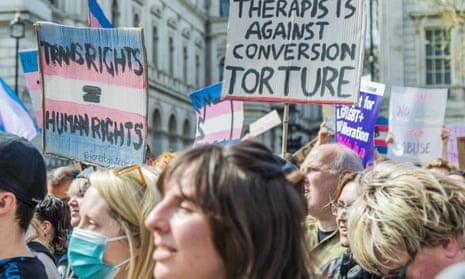The UK has dropped down the annual ranking of LGBTQ+ rights across Europe for the third year running, with organisers citing the government’s failure to fully deliver long-awaited reforms on conversion practices and gender recognition.
The International Lesbian, Gay, Bisexual, Trans and Intersex Association Europe (ILGA-Europe), which produces a yearly “rainbow map” of 49 countries across Europe, revealed on Thursday that the UK – which led the table in 2015 – had the most significant drop in ranking, falling from 10th to 14th place.
ILGA-Europe’s advocacy director, Katrin Hugendubel, described the UK’s plunging status as “a sad reminder that when governments don’t stand strong on their commitments to advance minority rights, a powerful opposition can use that space to spread hate and division”.
The chief executive of Stonewall, Nancy Kelley, warned that “years of progress on LGBTQ+ policy that was achieved under successive administrations has been rapidly eroded by a UK government that has taken its foot off the pedal”.
The ILGA highlighted the UK government’s failure to extend a ban on conversion practices to transgender people, as well as abandonment of promised reforms on gender recognition and its equality action plan. It added that the UK also lost points because the government’s equalities watchdog, the Equality and Human Rights Commission (EHRC), was “not … effectively protecting on the grounds of sexual orientation and gender identity”.
The EHRC recently published controversial guidance stating that transgender people could be legitimately excluded from single-sex services if the reasons were “justifiable and proportionate”, and called on the Scottish government to pause its own plans to streamline the gender recognition process.
NEW An EHRC spokesperson said: “We completely reject any suggestion that the EHRC is contributing to a decline in human rights for LGBT people in the UK”. They added that when rights of different protected characteristics overlap, “our role is to strike a fair and appropriate balance based on evidence and the law”.
Kelley said: “While the governments of both Scotland and Wales push forward in their goal of being LGBTQ+ inclusive countries, the UK government is dragging us rapidly down the international rankings.”
She called on the prime minister to “step back into the game” as a leader in protecting and promoting LGBTQ+ rights.
“As we approach the 50th anniversary of the first Pride in the UK, we call for his active leadership to rebuild our human rights institutions and to deliver a strategic policy programme that enables all LGBTQ+ people in the UK to live their lives in freedom and safety.”
A UK government Equality Hub spokesperson said the UK had “one of the world’s most comprehensive and robust legislative protection frameworks for LGBT people.
“We have been very clear that we will protect people from the abhorrent practice of conversion therapy by bringing forward legislation to ban it. Alongside this we have reduced the cost of applying for a gender recognition certification and moved the process of applying online, whilst extending same-sex marriage to Northern Ireland.”
